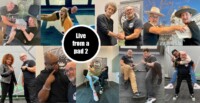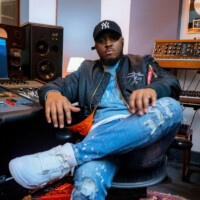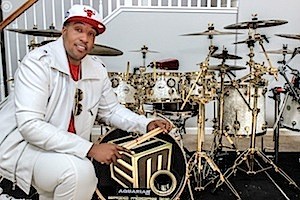 Best known for his fast hands and incredible chops, Eric Moore burst onto the drumming scene when he won the Guitar Center Drum Off in 2003. Just in case anyone was still in doubt about him, he featured on the very first Gospelchops.com DVD, shedding away with the likes of Thomas Pridgen and Tony Royster Jr.
Best known for his fast hands and incredible chops, Eric Moore burst onto the drumming scene when he won the Guitar Center Drum Off in 2003. Just in case anyone was still in doubt about him, he featured on the very first Gospelchops.com DVD, shedding away with the likes of Thomas Pridgen and Tony Royster Jr.
But Eric prefers to play music, and underneath all the chops lays a great groove drummer who spent the last eight years providing solid backbeats for one of the biggest Punk/Rock bands in America.
I had a chat with Eric about his upbringing, his time with Suicidal Tendencies and how Gospelchops might have been a tiny bit misunderstood.
You started playing drums when you were really young and even won a couple of jazz awards while you were at school. Was that the time you decided you wanted to become a professional drummer?
Yes, I started playing as a toddler. Coming from a church background my father plays organ and piano, and I had an uncle who played the drums. He put me on his lap and I was just able to play the drums. Whatever beat was going on, I could play it.
In school I started learning how to read music, learned my rudiments and later in junior and senior high school I joined the jazz band. They always had a lot of competitions going on for the bands. It was crazy: my first award I won was playing the xylophone.
Was it at that time that you decided you want to become a professional drummer?
Yeah. I always loved the drums and I always wanted to make it my living. When I was 17/18, right after graduating, you have to somehow make money to survive. But I always knew I wanted to play drums, I just had to figure out how to make it happen.
Would you say winning the Guitar Center Drum Off helped making it happen?
Yes. When I won the Drum Off in 2003 I was working as a security guard. Right after winning I was sure I had to figure out a way to play drums forever. I just wanted to make drumming my life and not have to do other jobs anymore.
The Drum Off gave me a great platform to start that. Letting people know who I was and definitely let people know that I can play a whole bunch of notes. My next thing was actually trying to let people know that I’m a musician, not just a solo drummer.
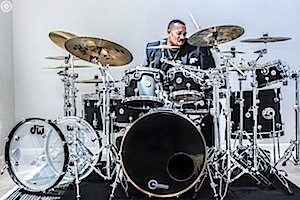 Did that ever cause a problem? Did people see you as the ‘choppy’ guy?
Did that ever cause a problem? Did people see you as the ‘choppy’ guy?
Even today a lot of people see me as a really flashy and spontaneous chops kind of drummer until they hear me playing with Suicidal Tendencies, Bobby Brown back in the day or different R’n’B artists. My first actual gig was with Sly and the Family Stone. That’s totally just straight form and grooving – no solos. Then my major first gig after that was with Infectious Groove – again no solos.
People watch me on YouTube and they just see me going berserk and play a whole bunch of notes but I love music, I love playing with a band and I like to be expressive.
For years now your main gig was Suicidal Tendencies. There’s a funny story how that came about.
Yes, very funny story. I’ve been a member for the last eight years. I went to a show in Sacramento. There bass player back then, Stephen Bruner, is a good friend of mine so I got to meet the guys after the show. They told me they needed a drummer for another project called ‘Infectious Groove’ so I gave them my number. After the show they called me and said they would do an audition but straight away gave me 40 songs to learn. So I drove to Los Angeles the next week to play with them and they just went: “So Friday we’re going to Australia on tour.” I just went: “Oh wow. Ok, let’s go!” It was crazy.
Has punk always been a passion of yours or was it new territory?
It was very new to me. Suicidal Tendencies was my first introduction into punk/rock music. Yes I grew up in church and played funk, hip hop, jazz, R’n’B but when it came to playing punk/rock it was a new avenue. I just wanted to learn and it’s really cool to be able to just step into any situation and make the best out of it.
Only a few hours before this interview you announced that you’re leaving Suicidal Tendencies?
Right. It wasn’t even really my call. With everything that’s going on I just think that the band, or maybe Mike Muir just feels that he needs a new platform. Maybe the band doesn’t quite get as much attention as he would like it to have. It’s a smart business decision.
It sucks, but if Eric has to be the let go in order for a mega superstar like Dave Lombardo to come in and fill in the seat, that’s how it is. It’s like if Travis Barker wants to play with Suicidal Tendencies – or if Travis Barker wants to play with any band – if he’d play for Megadeth, he should be able to. He probably has more fans than the band. [laughs]
I just have faith in staying very positive and not worry about it. I’m just gonna continue to practise, try to remain humble and sincere and man, hopefully that call comes. I love drums, I love people and I just wanna inspire the world to be honest.
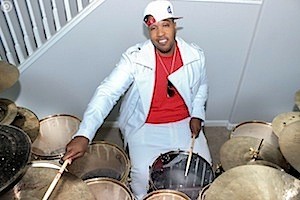 You have mentioned you played a lot of genres over the years. Is there any other genre you kind of fancy to conquer?
You have mentioned you played a lot of genres over the years. Is there any other genre you kind of fancy to conquer?
Honestly, I would love to play a huge country gig. Yeah.
I know it sounds so boring to a lot of people but I just want to venture into so many different fields from what people say the norm is for a person of my stature. It would be amazing to have a country gig. Even metal. I’m starting to learn some really crazy double bass stuff. I just wanna develop into other stuff and always have the fast hands to be able to go there whenever I want to but I wanna play something so out of the ordinary, people would never expect it.
Incorporating new things into my playing just keeps me motivated and practising. I always wanna reach for something higher.
There’s another project you’re working on called T.R.A.M. Tell me more about that.
The problem with it is that the biggest part of the project is ‘Animals as Leaders’ – which has Matt Garstka on drums and is a phenomenal project – and they’re just touring. It’s just been very difficult to find time because we’re all working. We definitely stay in touch though.
When we initially did the project we just all wanted to out together something completely out of the ordinary. We didn’t know that it would be as big as it was, it was just a: “lets come together and make some crazy music”. It’s a really cool project. I would love to link that back up and maybe do another album or even do a tour of the songs we already have, just to see how it went. I love those guys.
From the videos I’ve seen of T.R.A.M. it really looked like this was the project where you could really let go?!
Yes, it was definitely a project where Eric Moore could be Eric Moore. When I sit behind a drum set it’s no longer shy or super humble, I just love drums. When I sit behind a kit, no matter when I weight 500 pounds or the 285 I weigh now, it’s drumming.
That band totally allowed me to express myself and to be who I am. Even when we go to dinner together, Eric doesn’t have to watch what he says or be a certain way. It was definitely a great brotherhood playing with those guys and being around them.
Most of your recent work was as a band member rather than a session drummer. How do the two compare to you?
I actually love working in the studio and I do get people who hit me up on Facebook or Instagram and I’m always open to record drums for anybodies record – and I probably have the best prices ever. So never be scared to ask me about recording on a session.
Either way, I love performing live and I love studio work. Whatever comes, I’m totally down and available.
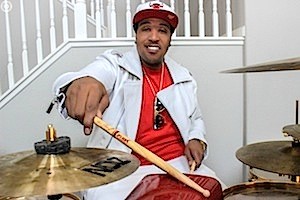 You were one of the very first guys involved in Gospelchops.
You were one of the very first guys involved in Gospelchops.
Yes, the founder and owner of the name Gospelchops is a man named Gerald Forrest. He came up with this idea to get in some drummers from the surrounding areas who play in church. Luckily that was the year I won the Drum Off so he wanted to get in touch with me because he thought it’d be a great name to kick it off – and because I had a bit of an internet buzz. He called me and I just loved to be the first person to kick off the series!
The idea was to give people a chop to learn. That was back in the day when YouTube just started in ‘03/’04. In the video I just gave them a chop to learn and a little bit of insight on me. The next thing was the Gospelchops series DVD which was called ‘Shed Session’. That was featuring me, Tony Royster, Thomas Pridgen, Jeremy Haynes and a whole bunch of other phenomenal drummers. That’s what kicked it all into the world of ‘Oh my God, what is this?’. I mean, drums and shedding was always a part. Do you remember the Buddy Rich memorial back in the day with Dennis Chambers, Dave Weckl, Steve Gadd, Vinnie Colaiuta – they all did that. As a community it’s just been a way of drummers to learn how to vibe of each other and take what you see somebody do and either ‘call-and-response’ repeat it or play it ten times faster. [laughs]
So the initial idea was educational?
Yes, Gospelchops was just another way to learn. A drummer like me, I learned reading music at school but I don’t have to read a note to be able to play what I heard on a record. I can hear it, see it and then execute it. When you’re shedding you hear a drummer play a sextuplet or a five stroke roll with a flam on the cymbal and you just go: Ok, I know exactly what he did and I can repeat it. It’s just quick way of learning. Some people have the gift to be able to do it and some people just don’t, but it’s just really, really fun.
Did you expect the success? It kind of became like a religion for some people.
It really did and still is to this day. In Brazil, in South America, Korea and other places it’s still very big, it’s like a form of life.
Do you think the idea of Gospelchops was a bit misunderstood by some drummers? I mean people spend a lot of time practising their sextuplet chops but might struggle playing a groove.
I believe that it definitely took the world by storm: positively and negatively. I remember going to London and Europe to do drum clinics and when I went into the club, all the drummers wanted to do every time they sat on a drum kit was play a whole bunch of licks. I just thought: that is not music. People can’t dance to that – and that is what we’re supposed to bring as a drummer. As the heartbeat of the band you need to make people groove and move no matter what you’re playing. Even if it’s metal, where your playing the fastest double bass chops, you still hear the groove and the pulse. When you’re playing a whole bunch of notes and stuff that does not make sense then it’s not ok.
Tell me about your DVD.
Yeah, in 2013 I was able to produce my own DVD called ‘The Eric Moore Experience’. I talk a little bit about different things in drumming (stuff I like to focus on) and I gave a great performance. There are nine songs that I’m playing and I also have three sections of a shared experience where they can play drums with me personally. It’s over two hours worth of footage and I really put my heart into the project. You can download it from my website or just have it shipped out to you.
Is the educational side of things something you want to get into more?
I really hope so. I wanna start drum lessons very soon. I’m just setting everything up to offer Skype lessons for people overseas. Also I wanna offer people to come out to Los Angeles to do like a full day lesson.
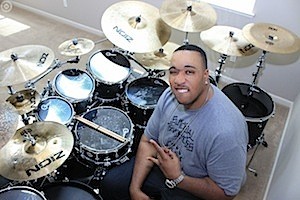 You’re also doing clinics, right?
You’re also doing clinics, right?
That’s my all time favourite thing! I definitely want to do more clinics and drum festivals. This year I’m going to Brazil for the whole of September doing drum clinics all over the country – and at the end of October I have a drum festival in Korea set up. The schedule is quite open at the moment which is nice because it is the opposite from my time with Suicidal Tendencies. I never knew what was coming up and I always just had to be ready.
Now that I have a little time I can hopefully practise, I wanna just get better and definitely do more clinics, yes.
Finally, what’s up next?
I really really want to start my own band with some amazing musicians. I do have another project with the guitar player of Suicidal Tendencies, Nico Santora, called Lillake. We’ve already recorded and released a first single. Hopefully we’ll do some more with that.
Ah, life of being a musician, that’s what a lot of people don’t know, you just go with the wind. A lot of drummers don’t even know what’s coming next year. It’s all about making your moves and staying positive because it’s a crazy business.
Hopefully some huge artist from London reads this interview and just goes: “Ok, I want him on my gig!” You never know!
Last year Thomas Pridgen was playing for Suicidal Tendencies for a minute, then he got a gig with some huge, international Italian artist. Where did that come from?
But man, I also love to come home to my wife. And you know what I come home to, you’ve seen my studio!
Anything else you’d like to add?
I just want to say this as an ending.
With everything that’s going on in the world it’s very, very difficult for people to stay motivated and to stay compassionate about something that they feel right about in their heart. The world is so big and there are so many people with bad attitudes. I just hope people can stay more positive and try to leave all this negative out of it.
For example having this thumbs down button on YouTube. The person who did the video was showing you their heart. When they put that up it wasn’t too say ‘I’m the best’ but maybe so you can learn something from it. No matter if the musician is amazing or sucks, you can always learn something from it – good things or bad things.
It’s really difficult but it’s all about being positive! One person can change 20 people, so I just hope to be a better role model for drummers and just people in general.
Interview by Tobias Miorin
March 2016

